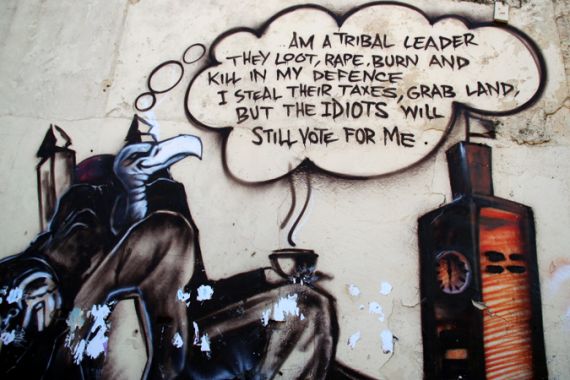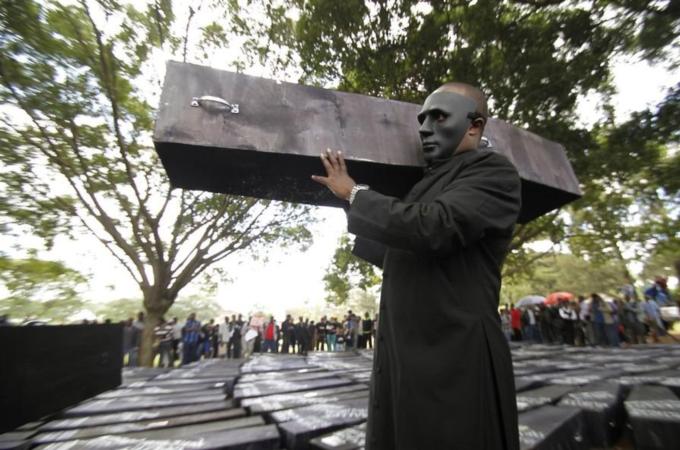Kenyan satire takes aim at ‘corrupt leaders’
Satirists, cartoonists and graffiti artists have a field day as politicians eye elections scheduled for March 4.

Nairobi, Kenya – A vulture-like politician sits in Kenya’s parliament, scoffing at the tribespeople who vote for him despite his money-grabbing ways.
This eye-catching graffiti image, decorating a wall in downtown Nairobi, attacks voting along ethnic lines and corruption in national politics.
Kenya has seen an explosion of such political satire in cartoons, television and street art that mocks politicians in the run-up to next month’s elections. “There is a secret in the picture,” said James Kamba, who runs a gift shop beside Nairobi’s best-known example of hard-hitting graffiti.
“It’s about the way members of government put money in their pockets while the people die poor. The picture tries to educate. If people see it, maybe they will learn something: not to vote like they did before.”
Only weeks before the March 4 presidential vote, Kenyans are gripped by a round-the-clock drama of personalities, ethnicities and policies. The leading presidential candidates hail from the tribal dynasties that have dominated Kenyan politics since independence from Britain in 1963.
|
Kenya holds first-ever presidential debate |
Raila Odinga, the current prime minister, hails from Kenya’s sizable Luo community, which has never had a tribesperson in the nation’s top job.
Uhuru Kenyatta is a member of Kenya’s biggest ethnic group, the Kikuyu, and is the millionaire son of the nation’s independence leader, Jomo Kenyatta.
The disputed 2007 election still casts a long shadow over Kenya. Inter-ethnic bloodletting claimed more than 1,100 lives and pushed the country towards civil war.
Kenyatta is also due to stand trial at the International Criminal Court (ICC) in early April as one of those accused of orchestrating the 2007-08 violence.
With such high stakes, Kenyan graffiti artists, comics and cartoonists have not been short of material when devising political parodies.
‘Voted for by idiots’
Boniface Mwangi is the spray-paint provocateur who conceived the suit-wearing vulture that decorates Nairobi’s business district. “It’s against both the politicians and Kenyan voters. The frontrunners in this election, Kenyatta and Odinga, are both tribal kingpins,” said Mwangi.
“They are being voted for by idiots. Me and all the other Kenyans who willingly put murderers, rapists and looters in power. I don’t want to make people laugh. I want to make them angry. To make them think.”
Kenya’s newspaper illustrators have embraced a softer approach to lampooning those seeking power in East Africa’s biggest economy.
One cartoon from The Star pictured Kenyatta and his running mate, William Ruto, wearing prison outfits while using computer control pads in a jail cell. The candidates were repeatedly asked how they planned to govern Kenya while standing trial at the ICC in The Hague.
The answer surprised many. They said they could manage the affairs of 43 million Kenyans via the internet from Holland. “See … we can run Kenya from The Hague!” said the caricatures of Ruto and Kenyatta, staring at a computer screen.
The veteran cartoonist Godfrey Mwampembwa, better known as Gado, said cartoons convey simple and powerful messages to readers.
His illustrated send-up of Kenya’s first-ever televised presidential debate on February 11 poked fun at the hackneyed slogans used by all eight candidates.
“Cartoon messages are easy to communicate,” he said. “It’s a cliché, and it’s true: a picture speaks a thousand words. Even those who cannot read can look at the cartoon and understand the simple message.”
Gado also created The XYZ Show, a weekly television parody that uses life-size latex caricatures to lampoon public figures.
One popular sketch had Kenya’s prime minister rapping “this is my time, Odinga time” to the beat of Dr Dre’s hip-hop anthem “Still D.R.E.”.
Another depicted Kenyatta and Ruto’s political union as a wedding ceremony in which the former rivals made pledges to each other. The alliance shocked many because Ruto, an ethnic Kalenjin, and Kenyatta are accused of orchestrating bloodshed from opposing sides of the tribal divide in 2007-08. In the satirical sketch, the rubber characters promised loyalty to each other “through sickness and in The Hague”.
Boom in political satire
Gado said that Kenya has witnessed a boom in political satire since he became a newspaper cartoonist more than two decades ago. Back then, Kenya was ruled by president Daniel arap Moi, a dictator who was accused of corruption and human rights abuses.
“We’ve taken huge leaps forward and are able to say things on television now that would have been impossible even 10 years ago,” Gado said. “Of course, it has been a struggle, but we are becoming bolder and expanding the space for criticism.”
The US-based watchdog Freedom House measures civil liberties around the world and ranks Kenya as “partly free”. This beats many African countries. But satirists have faced criticism. Government minister Dalmas Otieno accused The XYZ Show of ridiculing public figures “in the name of making money”.
Kenya’s cartoons struck a chord with Angelique Pitteloud, the wife of Switzerland’s ambassador to Nairobi, who hosted an exhibition of scathing art. She witnessed carnage during Rwanda’s 1994 genocide, when more than 800,000 ethnic Tutsis and moderate Hutus died in a three-month killing spree.
“There was no freedom of expression before Rwanda’s massacre,” she said. “That’s why it’s so important and courageous what the Kenyan cartoonists are doing. Using sarcasm as a weapon and building upon freedom of speech is crucial for democracy.”
 |
| Activists protested against lawmakers’ attempts to grant themselves perks such as state funerals and higher salaries [Reuters] |
While Kenyan satirists are lampooning the election process, it seems unlikely that they will play a decisive role in shaping the outcome of the vote. Most polls show Kenyatta and Odinga well ahead of rival candidates, but few indicate that either front-runner will achieve a first-round win.
Joy Mboya, who runs The GoDown Arts Centre in central Nairobi, said political satire is achieving something more subtle in Kenyan politics. “I don’t get a sense that it will change the way people vote right away, but it’s important that it’s there,” she said. “Politicians now realise that they cannot run away from the people and the media. And we feel there is a space for dialogue and challenging debate.”
Mwangi, the Nairobi-based street artist who admires Britain’s hooded graffiti doyen, Banksy, said he will continue agitating regardless of who wins the election. He led protests downtown last month after lawmakers’ attempt to grant themselves $107,000 in end-of-term bonuses and guarantee themselves perks such as state funerals.
In response, demonstrators torched 221 coffins in a mock funeral and waved placards bearing slogans such as, “Bury the vulture with your vote”.
“The message is reaching the masses and we are changing the language of the country,” Mboya said. “We don’t talk about politicians any more, we say ‘vultures’. Hopefully this will lead to the ballot revolution that we need.”